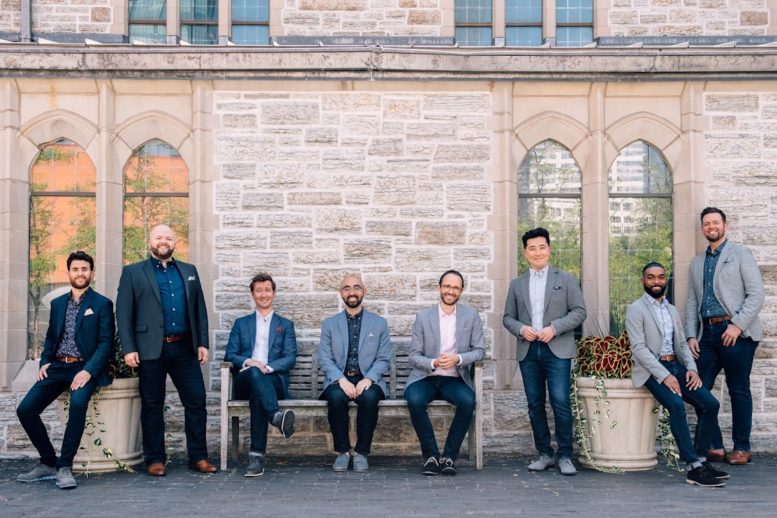By DAVID DUPONT
BG Independent News
The vocal ensemble Cantus tells stories in song. “Our goal is to give voice to shared human experiences,” said Alex Nishibun, who has sung tenor in the eight-voice male choir for almost three years.
That programmatic nature of the ensemble is part of what attracted him to Cantus, as well as its democratic nature.
“Cantus is a unique ensemble in that it’s entirely led by the artists themselves. There’s not one particular artistic director or conductor,” he said in a recent telephone interview. “That role is shared among the eight artists.”
When Cantus performs at Bowling Green State University on Friday Nov. 12 the theme will be “My Journey Yours.” Cantus is on campus for the performance and for a day of workshops on Saturday through the Helen McMaster Endowed Professorship in Vocal and Choral Studies. Friday’s concert will be at 8 p.m. in Kobacker Hall on the BGSU campus. Tickets are $8. Click to purchase.
Cantus is a low voice choir of tenors, baritones, and basses. “We get to decide what us perform,” Nishibun said. “we get to decide how we share this music. … We get to speak in our own artistic voices which is a very rare experience. We feel a lot of weight and respect for the craft because it’s absolutely of our own creation.”
Members of Cantus are: Jacob Christopher, Alberto de la Paz, Paul Scholtz, and Nishibun, tenors; Rod Kelly Hines, Jeremy Wong, baritones; and Chris Foss and Samuel Green, basses.
“My Journey Yours” explores why people move from place to place. Maybe it’s adventure. Maybe to find a better land. Maybe seeking safety. “We even touch on the idea of forced migration, highlighting the indigenous people of America itself,” he said.
“Migration in various forms has been a hot button topic for our nation.” Listeners can relate to the program in different ways. Cantus poses questions, but leaves the answers to the audience.
The program includes work by traditional composers – Jean Sibelius’ “Finlandia” with the words from the Methodist hymnal and Antonín Dvorak’s “Song of a Czech.” But it also includes “First Nations Lament” by Cairril Adaire and “Hope Is the Thing with Feathers,” a setting of an Emily Dickinson poem by Cantus tenor de la Paz.
The ensemble enjoys collaborating with contemporary composers and presenting their music. “It’s a really, really good feeling,” Nishibun said. “Our goal is to give voice to shared human experiences, and the modern repertoire of today is wonderful for that because it really speaks to the current climate.”
The ensemble commissioned “N-400 Erasure Songs” by Australian-American composer Melissa Dunphy. The three songs are interspersed within the program, with the first midway through the first half, one closing the first half, and another closing the concert.
The composer and two other poets created poetry by blacking out some words on an N-400 immigration form. “It’s gripping music that’s crafted specifically for Cantus, so it’s really satisfying,” Nishibun said.
The ensemble will also perform “N’ap Debat (We’re Hangin’ On)” by Haitian composer Sydney Guillaume. The piece speaks to the resilience of Haitians in the wake of the 2010 earthquake, a resilience tested again this year by another earthquake and Hurricane Grace.
Like everything else, the preparation of the pieces is a shared responsibility. The 100 or so pieces the ensemble prepares each year are divided up among the members.
They then make the initial decisions about phrasing and dynamics, and provide pronunciation guides. Enough “to get the music up on its feet.” After a few rehearsals, Nishibun said, other members will weigh in with suggestions, so what starts as the artistic vision of one musician ends up as the collective vision of eight musicians.
The ensemble persisted in this approach throughout the pandemic. Cantus is a full-time professional ensemble. All the musicians live in the Minneapolis area. During COVID times, they established testing protocols so that they could get together during the pandemic for two-week long retreats, dubbed Cantus Camp, in Iowa to rehearse and eventually release virtual performances.
Now, Nishibun said, they are glad to be back performing in person. This short run of shows, which starts in Bowling Green and then swings south, is their first since the pandemic.
It means they also get to work with students face-to-face. “Everyone has Zoom fatigue,” he said.
Virtual choirs “don’t scratch the same itch,” he said, for those who desire the collaborative experience of music. “Seeing these young artists perform you can see that love of the arts.” The “energy is palpable in the room” when they meet.
On Saturday Cantus will conduct master classes with university ensembles and present a session on careers in music.
True to the nature of the group, the individual members each have their own advice for the singers they work with. However, Nishibun said, all the performers believe that “following one’s passion artistically is what yields the strongest and most fulfilling experience for that particular person.”
He continued: “The arts, education or performance, are challenging careers. It’s tricky to pull off.”
A career as a musician takes a lot of work and energy to maintain. “But if that passion is there and if it’s just something you love doing, then gosh, it’s the most fulfilling thing in the world,” Nishibun said. “Something we always want to impress on students is that it’s not all sunshine and rainbows and a million wonderful gigs … but it is a beautiful experience and well worth it because of the artistic things you get put out in the world.”
And that’s important. “We do lean on the fact that we think the arts are essential to a healthy society,” Nishibun said. “So we really do encourage that these student pursue it and give their all. It’s a beautiful thing.”

